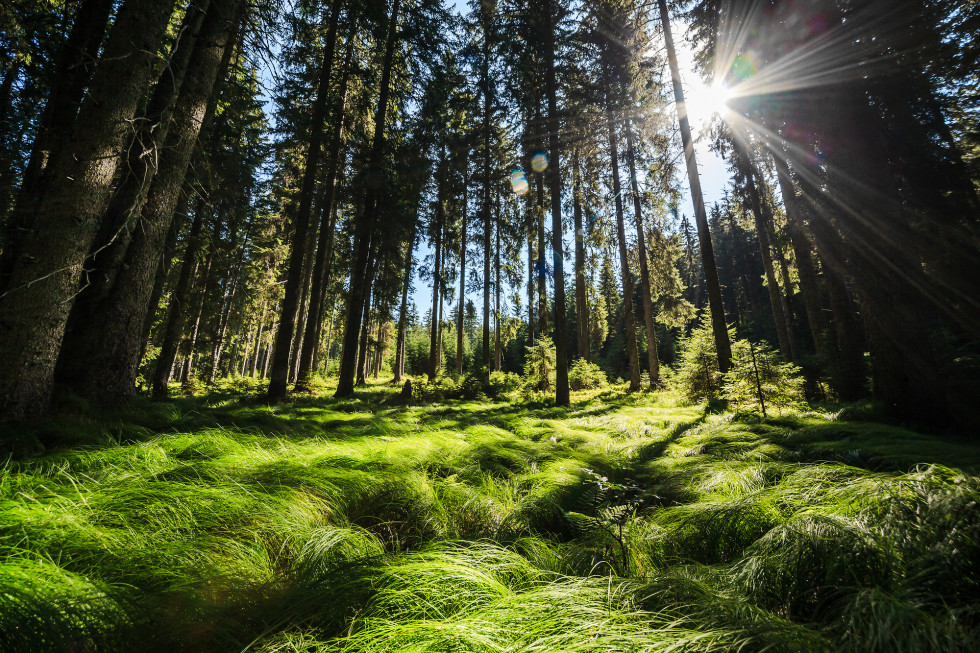Healthy nature for healthy people
This year, the International Day of Forests, celebrated on 21 March, focused on the link between forest health and the health of people, as well as on the role of sustainable forest management in mitigating climate change. This year’s World Water Day, on the other hand, celebrated the day after, focused on accelerating change to ensure better access to clean water and sanitation. The focus was on the importance of water for individual ecosystems and the need to manage water supplies responsibly in the context of sanitation, agriculture and industry.
Forests help mitigate some of the effects of climate change on human health by acting as carbon sinks and regulating the planet’s temperature and water flows. According to the Statistical Office of the Republic of Slovenia, in 2020, a hectare of forest in Slovenia sequestered an average of nine tonnes of carbon dioxide. However, in recent years, forests in Slovenia have been under attack due to increased natural disasters. Last summer, the largest fire in the history of independent Slovenia raged in the Goriška and Komen Karst regions. This year, most of the felling of damaged trees is expected to be completed, while reforestation is underway. According to national statistics, environmental conditions are also increasing the incidence of forest tree diseases, which is also reflected in the structure of sanitary logging.
Most of Slovenia’s forests are managed and their timber stock is used for commercial purposes. According to the Ministry of Agriculture, Forestry and Food, forests are one of the mainstays of many Slovenian farms and a key link in the forest-wood chain. Under the rural development programmes 2007–2013 and 2014–2020, the Ministry has supported various investments in the forest-wood chain amounting to €80 million. As a result of positive experience, the new CAP strategic plan 2023–2027 foresees the continuation and upgrading of measures in the area of the forest-wood chain.
On World Water Day, which aims to raise awareness about the importance of drinking water, the Ministry of Agriculture reminded people that clean drinking water is not a commodity to be taken for granted, but is part of a carefully planned framework of regulations and measures to ensure water conservation. As they pointed out, agriculture can cause water pollution, mainly through the improper or excessive use of organic and mineral fertilisers and plant protection products. “Therefore, one of the strategic directions for the development of Slovenian agriculture is to reduce its negative impacts on natural resources, in particular drinking water sources,” they added. According to the Slovenian Statistical Office, more than two-thirds of wastewater in Slovenia is treated.
The environmental NGO Ecologists Without Borders will mark World Water Day with the launch of a new nationwide map of 567 drinking fountains, which aims to reduce the consumption of bottled water. The organisation has marked all locations in the country on the map where access to drinking water is available through public infrastructure or maintained natural resources.
This year’s World Water Day coincides with the start of the UN Water Conference in New York. The Slovenian delegation to the conference is led by the country’s President Nataša Pirc Musar and includes the Minister of Natural Resources and Spatial Planning Uroš Brežan and the Minister of Foreign Affairs Tanja Fajon. In the context of Slovenia’s candidacy for a non-permanent member of the UN Security Council, Brežan assured that Slovenia is a credible international partner on water. At the conference, Slovenia will make two commitments to the Water Action Agenda – a commitment to upgrade the early warning system for floods, low flows, droughts and forest fires in the international Sava River basin, with an extension to the Adriatic Sea, and a commitment to a strategy for the restoration of watercourses in the Slovenian part of the Mura-Drava-Danube Biosphere Reserve with five countries, as declared by UNESCO.

